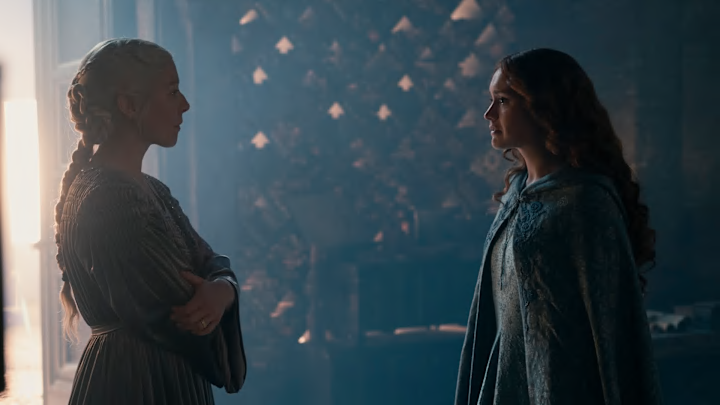Ever since Hollywood started adapting books to the screen, debates have raged over which version of any given story is better. It continues to this day. For instance, HBO is currently adapting George R.R. Martin's book Fire & Blood to the small screen as House of the Dragon. The show wandered pretty far afield of the book in its second season, and Martin was uncommonly honest about his problems with it. It still sounds like it bothers him.
House of the Dragon showrunner Ryan Condal was disappointed by Martin's reaction. "[W]e really enjoyed a mutually fruitful, I thought, really strong collaboration for a long time," he said back in April. "But at some point, as we got deeper down the road, he just became unwilling to acknowledge the practical issues at hand in a reasonable way."
Is that a good enough justification for Condal and company changing Martin's story to the extent they have? We'll get to that in a minute. First, Condal shared some other thoughts on adapting Fire & Blood during a cast and crew roundtable interview on the Happy Sad Confused podcast, recorded months ago but released on YouTube just a few days ago.
Fire & Blood is an interesting book to adapt because, unlike Martin's A Song of Ice and Fire novels, it's a "fake history book" where a "historian" is piecing together what happened during this inter-family Targaryen war years after the fact. "It is our cross to bear, cause you're working with this beloved world and this beloved work, which is a history book," Condal said. "The world is dense but the information is not necessarily."
House of the Dragon writer and producer Sara Hess offers that, in some ways, Fire & Blood is "kind of the opposite of dense." I get what she means, because the book describes events but we don't have access to many of the characters' thoughts or private moments the way we would in a novel.
Condal continued: "[W]e're trying to provide an objective POV on a series of historical events that were described by three different fictional narrators, and they conflict with each other. So this is our throughline through this very complex thing, and our interpretation of that is going to be different than this person's interpretation, that person's interpretation. So I think that's the thing: keeping your true north through it all, and for me it's always been: I've been a fan of these books for 25 years. I discovered these books in the year 2000, and immediately had this resonant bond with them...I feel like I've lived in the world, so my approach to it has always been, 'What is the show that I want to see as a successor to Game of Thrones?' which I'm also a giant fan of, the show and the book."
"And there really is no one way to adapt this, there is no one true adaptation of this particular story because of the nature of the way it's written. There's a constant dialogue between us. It's collaboration and compromise all the time. Sara and I have different points of view on things. Sometimes those come together in synergy, and sometimes it's going to other writers and saying, 'Who's right and who's wrong here?'""
In the broad strokes I agree with a lot of this; Martin's book is unique and you're going to have to choose one "official" version of what happened, whereas Martin sometimes provides us with alternate takes on events. You're going to have to fill in some of the characters that Martin sketches. At the same time, I think the show has gone way too far with its changes, because it's often done the opposite of what the book has described.
Take the example of Alicent Hightower and Rhaenyra Targaryen, who in the book are on opposite sides of this war. In the season 2 finale, we learn that they actually started to conspire together. That's not filling in a missing beat in the text, that's completely changing the nature of how these two characters interact with each other. If you want to build out a character beyond the text, do it in a way that stays true to what we actually know about them from the book. I don't think there's a way Condal or anyone can talk their way around this point: if you have the characters from a book do the exact opposite of what they do in the book, you're not adapting the book.
There are other examples we could cite, but to me that's the one big one that can stand in for the others; head here if you want an exhaustive list.
The third season of House of the Dragon is being filmed as we speak (the podcast was recorded before shooting began) and should be out on HBO and HBO Max sometime next year. I don't really consider it an adaptation of Fire & Blood anymore, but I have hope that I'll enjoy what they come up with.
To stay up to date on everything fantasy, science fiction, and WiC, follow our all-encompassing Facebook page and Twitter account, sign up for our exclusive newsletter and check out our YouTube channel.
